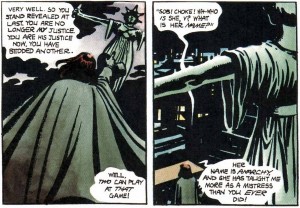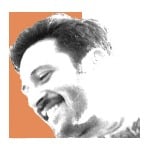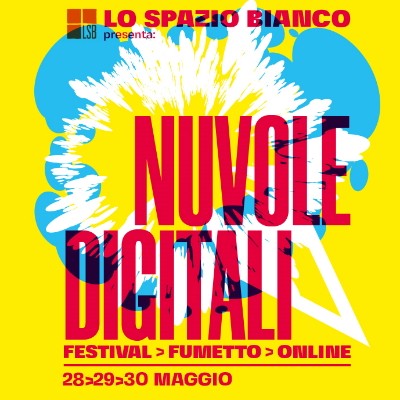BIO: Lloyd started working in comics in the late 1970s, drawing for Halls of Horror, TV Comic and a number of Marvel UK titles. With writer Steve Parkhouse, he created the pulp adventure character Night Raven. Dez Skinn set up Warrior magazine in 1982; he asked Lloyd to create a new pulp character. Lloyd and writer Alan Moore (who had previously collaborated on several Doctor Who stories at Marvel UK) created V for Vendetta. Lloyd, who illustrated in cinematic chiaroscuro, devised V’s Guy Fawkes-inspired appearance and suggested that Moore avoid captions, sound effects and thought balloons. After Warrior folded in 1984, the series was reprinted and continued in colour by DC Comics and collected as a graphic novel in 1995. Lloyd has also worked on Espers, with writer James D. Hudnall, for Eclipse Comics; Hellblazer, with writers Grant Morrison and Jamie Delano, and War Story, with Garth Ennis, for DC; and Global Frequency, with Warren Ellis, for Wildstorm. With Delano he also drew The Territory for Dark Horse, where he has also worked on some of their licensed properties like Aliens and James Bond. He has also created a graphic novel, Kickback, for French publisher Editions Carabas. David Lloyd is now working on his online exclusively, anthological project, Aces Weekly.
 Hi, I’m from Lo Spazio Bianco, an italian comics’ site. We want to ask you some questions. The first one is: what you fell about the evolution that V and especially the icon of the mask of V got in the Movement, in the political movement, nowadays? It becames an icon, what you fell about it?
Hi, I’m from Lo Spazio Bianco, an italian comics’ site. We want to ask you some questions. The first one is: what you fell about the evolution that V and especially the icon of the mask of V got in the Movement, in the political movement, nowadays? It becames an icon, what you fell about it?
Well I think it’s a very good. The great thing about the image of V, as represented by the mask, is that it’s neutral. That’s why it can be used in any demonstration against any tyranny – even a perceived tyranny – by those who feel themselves oppressed culturally or socially or politically. And it’s great that such a symbol exists that can be used by everybody. I mean it can be used across the world in any kind of demonstration simply because it simply means resistance, resistance to any authoritarianism, which is great.
Do you think that symbol was like distorted from the Wachowski’s movie or it still kept its force, its rebellious force and do you think yourself as rebel?
Well, I don’t think the Wachowskis could spread one of the key messages of V which is, you know, the values of anarchy. They couldn’t do that in a Hollywood movie – it wouldn’t be possible to do I think. What they did do, was impress upon people through the movie the absolute, the essential need for individuality. And if you take individuals and combine them together into a mass protest that disrupts the state and makes the function of government impossible then you have the chaos that can lead to anarchy – and that’s as far as the Wachowskis could go, perhaps, in what they depicted in the movie. The power of the individual against an ideological tyranny. And, to answer your other question – I’m not a rebel except in my own attitude to life : I don’t feel the need to conform and I’ve never felt pressured to, and conformity is too often used by rulers as way of controlling society, putting them in convenient boxes they can manage. This is why the individual is so important. The individual should make his own mind up and not follow the herd, but too many people do just follow the herd. Too many people are like sheep. If we can all stop doing that, and follow our own real beliefs, I’d guess we’d have a great society. Not enough of us do that – we do what everybody else does or our friends do without thinking about it enough and that’s our big problem.

 Do you want to say something about your last project Aces Weekly?
Do you want to say something about your last project Aces Weekly?
Yes. Aces Weekly is really important to me, it’s also an example of what I mean about trying to do something different. What I’m doing with Aces Weekly is getting a bunch of great creators together to produce an anthology magazine that is exclusively digital and only available via computer. Basically the idea is just to put great comic art on screen instead of on paper. The problem with paper publishing is that you have to print it, store it, distribute it, and get it in the stores – and all that takes away money that should go straight to the people who produce the work. With Aces Weekly we go straight from the creator to the buyer and all the money that comes from the subscriptions we receive from them for every volume is split equally between all the contributors. So it’s a new way of doing things, a better way of getting more money to the artists and writers. It’s a very important project for me. It’s at www.acesweekly.co.uk. I’d like to initiate an italian version, sometime.
And last question: what do you think about Italy and our political and non political situation because last times you spent a lot of time in Italy, so you travel a lot. Your way of seeing stuff as a drawer it’s a particular way you can get the particulars, all that stuff so we want to know about it, what you think about it.
Well, well I love Italy, that’s why I like coming here. It’s a great place, great people, great wine, great food.
 And about political stuff?
And about political stuff?
From a political point of view it’s a very fascinating country. I think the politics reflects the nature of the people. People are open to change – and they like style and fashion and variety. And activity and colour. So you have colourful governments, changing governments. Italians like an interesting life, and don’t like being bored – so maybe that’s why you have so many mixes in government, and changes in those mixes…
[Ironic] Pioneers in new way of confronting political power.
Yeah, yeah.
Thank you very much, it was a pleasure.
My pleasure, too.
Interview live April 6, 2013






